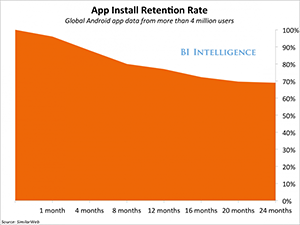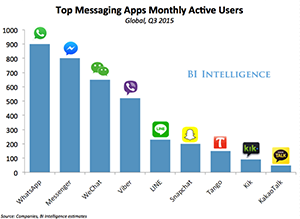| Here at BI Intelligence, Business Insider's premium research service, our goal is to provide:  | Unbiased insight and analysis
|  | Forward-looking views of changing trends and impending disruption
|  | Advanced curation of key topics to help you make smarter decisions
| As part of this mission, we have a team of dedicated analysts focused on researching and identifying the core issues you need to know within your key areas of interest. To succeed today, businesses need to understand the technologies and platforms that underpin the mobile service economy. At its core are the software and applications that enable device functionality. There are millions of apps competing for downloads on iOS and Android devices, but mobile audiences are concentrating their activity in fewer of them than ever before. And while emerging platforms — like messaging apps — offer exciting new opportunities, keeping up can be confounding. To help our clients stay ahead of this rapidly changing environment, BI Intelligence is launching new coverage — Apps and Platforms — led by Senior Analyst Will McKitterick. We interviewed Will about the current state of the mobile industry, including how the rapidly ballooning app ecosystem is shaping up. Here are his answers… | BI Intelligence: Will, why launch Apps and Platforms? And why sunset the Mobile vertical? | |  We're not moving away from mobile. Rather, our focus is shifting to what we see as the most disruptive area within the mobile industry. Consumers spend about 90% of their time on mobile devices in apps these days. That's huge. We're going to see the app economy really grow over the next few years. Companies just need to get better at monetizing their products and services on mobile. So when we talk about how businesses engage on mobile, we're really talking about what they're doing with apps.
But, at the same time, with close to 5 million apps available, it's difficult to build a successful app. We're excited to help provide the information companies need to better market, deploy, engage, and monetize their apps. It's something nearly every company needs to know how to do these days. Even though "Mobile" may be gone from our vertical heading, everything we cover is going to be from a mobile perspective. Mobile is ubiquitous today. You can't discuss digital disruption without it. | | | Makes sense, but where does hardware fit in? | | | We're not dropping hardware. We're building on our previous mobile coverage, which includes our core shipments forecasts and analysis of the supporting industries around devices. But there's no denying that the mobile hardware space has cooled off. We've witnessed a massive slowdown in smartphone shipments this year. China has been a significant factor there because its pool of first-time buyers is shrinking rapidly.
At the same time, there are these interesting new devices just hitting the market. We're really excited about the potential of virtual reality and wearables. They have some major hurdles to overcome, but prices are sure to drop and the hardware is guaranteed to improve. | | | So you were saying the vast majority of apps fail. If I'm a business, is there anything I can do to improve my chances of success in this crowded environment? | | | It's definitely not easy to build a successful app. We're in the midst of a mobile engagement crisis. The average app loses 77% of its daily active users within the first three days after install. But at the same time, many don't know that the majority of users keep apps installed on their devices two years after download even if they stop using them. The longer a user keeps an app, the longer developers have to reengage that customer. That makes understanding how to effectively use re-engagement tools, like push notifications, so important. It's important but it's not obvious. Companies need to understand how consumers interact with apps and how to leverage new technologies to better engage them. | | | What about the other half of your coverage? Why the focus on platforms? | |  Mobile is rife with platform-based businesses. Think about Apple, Android, or Facebook's Messenger. These are mini ecosystems situated within mobile. Platforms are networks that create value by facilitating interactions between product and service providers and consumers. And many have grown to the point where they're now able to wreak havoc on traditional businesses. Think about what Airbnb has done to the hotel industry or what Uber has done to taxis.
But the platform space is volatile and often zero-sum. For instance, the more time consumers spend downloading and using apps from the iOS App Store, the less time they have to watch ads on Facebook. Snapchat is on top of the mobile messaging world today, but could easily be replaced by Kik tomorrow. That means businesses need to think carefully about which platforms they partner with and how they deploy on them. We aim to keep our clients abreast of how these ecosystems evolve so they can capitalize on them. | | | Speaking of platforms, there's a lot of buzz around messaging apps. Tell us, are they really going to upend the mobile ecosystem? | | | I think they already have. Messaging apps surpassed social networks in size last year. The top four platforms now have about 3 billion monthly active users. That's crazy. There's no way you can ignore the size of that audience if you're a business. And chat apps are growing into their own platforms.
Messaging is only one of a number of things users do in these apps. For example, some of the most advanced messaging apps in the world — think WeChat, LINE, and now Facebook's Messenger — allow users to make calls, purchase products, watch video, send stickers, and a slew of other things. And chat bots are making all of these types of interactions automated. These capabilities are going to make it even easier for companies to connect with customers. They are even more than platforms. I'd consider chat apps the next operating systems. | | | Publishers are beginning to experiment with messaging. Will chat apps replace social networks as the next major channel for content distribution? | |  There's no question they will change the way we consume content, but chat apps are an entirely different type of distribution channel. They offer really unique, one-on-one conversations between publishers and their followers. That means content can be personalized in a way that just isn't possible anywhere else. And all of it is extremely accessible to the reader. Getting the news and media I want on demand is going to be as easy as sending a text to a friend. But it's important to remember that these interactions are also extremely sensitive. Publishers need to be careful not to spam users with content. Once unsubscribed, you'll never get that reader back. | |
Want to keep up with the latest developments in apps and platforms? If you want to keep up to date with the latest developments in Apps and Platforms and gain access to all of the research and reports from Will McKitterick and his team, subscribe to BI Intelligence today, risk free! By signing up, you'll be adding Will and a whole team of extremely intelligent analysts to your team. In addition to Apps and Platforms, BI Intelligence covers Payments, Digital Media, the Internet of Things, E-commerce and Fintech. All research is presented in an easy to digest format through reports, newsletters, charts, and infographics and includes the underlying data for your reference. Learn more today » |
Tidak ada komentar:
Posting Komentar